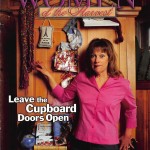Two months in Austria, the stamp in my passport claims. Already I can order ice cream in a cup and greet the supermarket clerks with an authentic-sounding local accent. On a day free of time constraints I strike off on my own. The plan: ride the Schnellbahn to a district outside of Vienna in search of a used bike.
Keeping to the agreement I made with myself — German only — I tell the man at the counter my destination and ask for a ticket. I wonder, “which side of the tracks do I wait on? Logically, the train would be running on the right track. Therefore, the doors would open on the right side which would be closest to the station building.” Wrong. The ticket man yells out the door and points to the other side of the tracks. I barely cross over and the train arrives. The Schnellbahn certainly lives up to its name, ‘fast train.’ How do I get on? Do the doors open automatically? Do I have to push a button or turn the handle? There is no button and turning the handle does not work. I hear a whistle and see that the door of the first car is open. The conductor punches my ticket on my way in. I closely follow the train’s progress with one finger on the map. There are no surprises in the route and I get off at the stop I want.
Now on foot, my goal is to locate the used bike store which turns out to be much farther than I estimated. To my delight I discover a swimming pool along the way. My eyes scan the price list for any recognizable German words and find none. I could probably ask one or two questions, but might not understand the answer. “Too much trouble,” I decide, and continue my search for the bike store. I find the address, but there is no indication that it is a store. A lady tells me that it is no longer there, but she knows of another one close by. I find that place. $300 a bike! I think not!
A park is nearby where I drink a coke and read. The sky warns me that it is about to rain so I start walking toward the Schnellbahn station, 40 minutes away. I check the schedule for the time of the next train and discover that from here the trains go off in different directions. Which one do I take? None have a destination that I recognize. So, when one stops and the conductor gets out, I ask. Yes, this is the right one. I note the stops, a little more confident that I know what I am doing. The village I call home is a welcomed sight. I try to get off. Wrong side, but finally, I’m off, grateful to see familiar buildings.
Walking across a footbridge, a man talks to me. Although his tone communicates that he is being pleasant, I translate his words into English and come up with “Only men are allowed on the bridge today.”??
Adapting to my new world is exhausting. The unfamiliar, the unknown, and the unexpected smash the dear-to-my-heart ideal of ‘I know what I’m doing.’ But, I remind myself that I know more today than I did yesterday and by this time tomorrow I will know even more. After many tomorrows, these foreign ways and words will be as my own.
©2002 Thrive
View the original print magazine where this article was first published.


